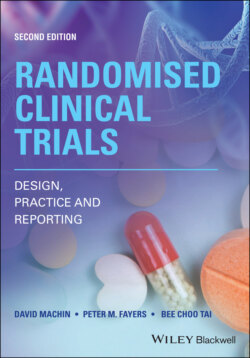Читать книгу Randomised Clinical Trials - David Machin - Страница 50
2.4 The consent process
ОглавлениеOnce a potential participant is deemed eligible for the trial, fully informed consent is required before the individual can be formally registered for the trial and the intervention allocation process implemented. Of course, before consent can be sought those responsible for obtaining consent should regard the trial they are advocating as ethical from their own perspective. A simple ethical test that works for most researchers is: if your mother/father/child had this condition, would you be willing to enter them into the proposed trial? If not, are you sure the trial is ethical? Only if the consent seeker is in the state of equipoise, that is, has an indifferent opinion about the relative merits of the alternative treatments, is randomisation considered ethical.
An integral part of the consent process is providing the individual concerned with full information pertaining to the trial including the potential benefits (if any) and risks. This information may be provided in a number of ways which will depend on the context, but will usually comprise written information as well as a verbal explanation of what is involved. The language of both the written and verbal components has to be chosen carefully and should be phrased in non‐technical terms whenever possible. Clearly, the consent process must provide full details of the intervention options and should explain what the objectives of the trial are and that the interventions will be allocated using a chance mechanism. If participating in the trial involves extra medical examinations or requires more (possibly invasive) samples to be taken from the patient than would be routine for the condition concerned in standard practice, then this needs to be made clear.
Also, it is a requisite of the process that the individual should not be pressurised into giving consent so that, for example, adequate time should be allowed by the investigating team for individuals to decide and, often in the case of patients, to discuss the situation with relatives or friends. It should also be explained that even if consent is given, the subject is free to withdraw that consent at any time without compromising in any way the quality of their subsequent care.
Regulatory requirements usually insist that the informed consent process is fully documented, and the consenting individual signs a consent form which is then appropriately witnessed. This part of the process will also need to be adapted to the particular circumstances. For example, in a trial concerning paediatric patients the consent process will be directed at the parent or legal guardian of the child who then consents on the child’s behalf. Other situations where the consent process may have to be carefully considered may be in accident and emergency situations, patients who are mentally compromised, have psychiatric conditions or who are frail and elderly.
It is important for the investigating team to be, and remain, fully conversant with local, national and even international regulations pertaining to the consent process. Although for international studies, it may be sufficient to write in the protocol, quite simply, that patients must give fully informed written and signed consent, and participating clinicians must also conform to local requirements.
